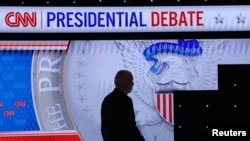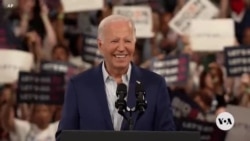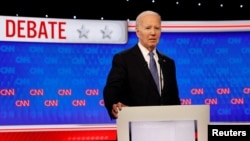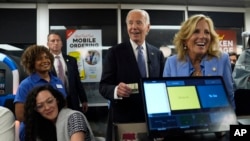After what many deemed a disappointing performance by U.S. President Joe Biden in Thursday night's debate against Republican presumptive nominee Donald Trump, Democrats are discussing whether their 81-year-old incumbent should be replaced at the top of the presidential ticket by someone younger.
Biden needed to reassure loyalists, as well as try to convince the small but critical number of independent voters in swing states that he is still mentally and physically fit to lead the nation.
Initially speaking in a soft, hoarse voice, Biden came off as incoherent at times, appeared confused, lost his train of thought and verbally stumbled during his 90 minutes at the lectern opposite Trump, who was more articulate and less combative than usual, although the former president uttered many more untruthful declarations than Biden.
"The most salient detail of the evening was Biden's tone of voice, which was faltering and not strong. It was his inability to come up with easy-to-follow coherent answers to questions, and he did that half the time, but half the time he didn't, and in a number of cases he lost his train of thought," Michael Kimmage, professor of history at The Catholic University of America in Washington, told VOA's Ukrainian Service.
Biden had a cold and a sore throat but tested negative for COVID-19 before the debate, White House press secretary Karine Jean-Pierre told reporters aboard Air Force One on Friday.
Friday headlines in major U.S. newspapers described panic and alarm among Democrats. Notable officials in the party and at the White House, along with top donors, began pondering whether Biden could continue to lead the ticket, news sites said.
On Thursday evening, The New York Times Editorial Board urged President Biden to leave the race. The influential newspaper described Biden as an admirable president but "the shadow of a great public servant."
"Voters cannot be expected to ignore what was instead plain to see: Mr. Biden is not the man he was four years ago," the editorial said. And this election, it added, is about "nothing less than the future of American democracy."
There are "no conversations" about Biden stepping aside, the reelection campaign's communications director, Michael Tyler, told reporters on the president's plane during Friday's flight from North Carolina to New York.
The president is also committed to a rematch with Trump on the debate stage, Tyler added.
"Joe Biden will be there on September 10. We'll see what Donald Trump does," he said.
Few pundits believe the president will be swayed to leave the race.
"I cannot imagine Biden will drop out, NYT commentary or not, unless there is some major health matter that is not public knowledge. Or if one develops between now and Election Day," Stephen Farnsworth, a professor of Political Science and International Affairs at the University of Mary Washington, told VOA.
"If nothing else, the Democrats have no plan to implement if they turn away from Biden. A huge divisive convention fight would put the party in an even worse position for November, particularly given all the people who would want to be the candidate and all those who would be angry that their own favorite was passed over," he added.
Yet, half of those surveyed (49%) in a YouGov poll about Thursday's debate said the Democratic Party should nominate someone besides Biden, while nearly a third (30%) responded that the incumbent should remain as the party's nominee.
Biden, until Thursday night, had been on course to accept, without any remaining challengers, his party's nomination at the Democratic National Convention in Chicago in August. That was cast in doubt after his poor performance in Atlanta on Thursday night during the debate hosted by CNN and carried live by some 20 other television networks in the United States.
Unless Biden voluntarily steps aside soon and surrenders the delegates pledged to him, there is virtually no chance of anyone successfully challenging him for the nomination at this stage.
The party faces a critical deadline on August 7, about two weeks before the traditional convention roll call vote. That is when the traditional bellwether Midwestern state of Ohio requires party candidates to be determined. It had been assumed Biden and Vice President Kamala Harris would again be at the top of the Democrat's ticket.
Ohio has long favored incumbent presidents seeking another term, but Trump was victorious there in the last two elections.
It has been exactly a century since the Democrats held a convention that was truly an open contest, nominating James W. Davis as their presidential candidate after more than 100 ballots. Davis, a rather obscure former congressman, lost the general election to Republican incumbent Calvin Coolidge in a landslide.
The last time there was significant drama at a Democratic Party convention was in 1968 in Chicago, months after President Lyndon Johnson dropped his re-election bid.
Division in the party grew after one of the leading contenders, Robert Kennedy, was assassinated. Vice President Hubert Humphrey was nominated amid pandemonium inside and outside of the convention hall. Humphrey was defeated by Republican Richard Nixon in the general election.
Looking ahead to another possibly disruptive convention in Chicago, Democrats on Friday began speculating about who might step forward to try to replace Biden, if the president were to bow out. Besides Harris, among those on the short list are four state governors: California's Gavin Newsom, Michigan's Gretchen Whitmer, Kentucky's Andy Beshear and North Carolina's Roy Cooper.
All have been viewed as likely presidential primary contenders for the party in 2028.
Some Democrats are having none of it — at least not yet.
"Democrats are historically prone to panic, even though their presidential candidates normally fumble the first debate — Barack Obama in 2012 is a great example. The answer isn't to replace Biden, but to take a very critical eye to what didn't work about his debate prep," veteran party strategist Max Burns told VOA.
Obama on Friday agreed, saying in a social media post "bad debate nights happen. Trust me, I know. But this election is still a choice between someone who has fought for ordinary folks his entire life and someone who only cares about himself. Between someone who tells the truth; who knows right from wrong and will give it to the American people straight — and someone who lies through his teeth for his own benefit."
"Biden is still the best messenger Democrats have for the message they are campaigning on, but there's clearly work to be done," added Burns, who runs Third Degrees Strategies, a strategic communications and consulting firm. "Their success in November will depend on their ability to honestly assess their weak spots and quickly course correct."
"I refuse to join the Democratic vultures on Biden's shoulder after the debate," Senator John Fetterman, a Democrat from Pennsylvania, posted on social media on Friday morning. "No one knows more than me that a rough debate is not the sum total of the person and their record."
Fetterman, a survivor of a stroke that compromised his speech processing capabilities, struggled on the debate stage two years ago before defeating his Republican opponent in the general election.
Biden's physician in February declared him fit for duty, despite being treated for multiple medical conditions: nonvalvular atrial fibrillation, hyperlipidemia, gastroesophageal reflux, seasonal allergies and sensory peripheral neuropathy of both feet. Dr. Kevin O'Connor also wrote that the president's stiff gait and obstructive sleep apnea remained stable.
As a senator in the late 1980s, Biden was treated for two brain aneurysms.
The president, during a midnight visit to a Waffle House restaurant in Atlanta following his face-off with the 78-year-old Trump, was asked by a reporter how he thought he performed during the debate in which each candidate peppered the other with caustic remarks.
"I think we did well," Biden responded.
He appears to be a lone voice making that assessment.
"I know I'm not a young man," said a somewhat rejuvenated Biden at a Friday afternoon rally in Raleigh, North Carolina. "I don't debate as well as I used to" but "I know how to tell the truth. I know right from wrong. I know how to do this job. I know how to get things done."
Biden coughed occasionally, still showing the effects of what campaign officials said was a cold that affected his debate performance the previous evening. His remarks were interrupted several times by pro-Palestinian demonstrators.
Trump "is literally a threat for everything America stands for" and "is motivated by revenge and retribution," said Biden. "Trump will destroy our democracy. I will defend it."
Trump, at his first post-debate rally midafternoon Friday at a farm in Chesapeake, Virginia, reveled in his opponent's lackluster performance the previous evening. But Trump said he doubts Biden will step aside because the incumbent "does better in the polls than some of the people they're talking about" possibly replacing the president as the Democratic Party nominee.
Governor Newsom was singled out for mention by Trump, saying the 56-year-old "can't run California … he's doing a terrible job."
Newsom, immediately after the Biden-Trump debate, quashed any speculation he would be on the presidential ballot in November.
"We've got to have the back of this president," the governor said on MSNBC. "You don't turn your back because of one performance. What kind of party does that?"











